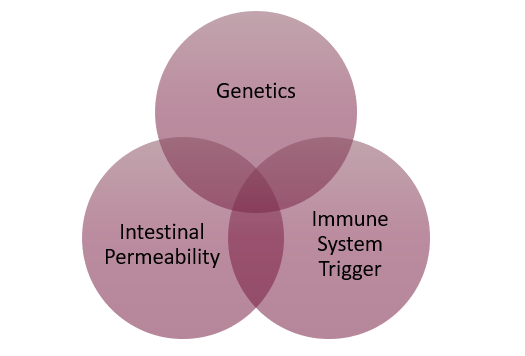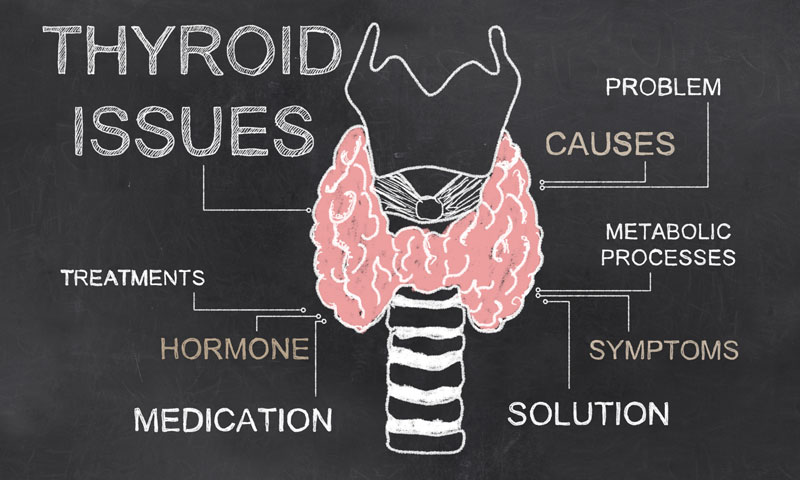What Causes Autoimmune Diseases?
Factors in the Development of Autoimmune Disease
When I was learning how to drive, we were required to watch a movie called “The Final Factor”. The gist of this movie was that car accidents usually happened because of not one unlucky variable, but several factors. Autoimmune diseases are like that. There are a series of factors that when we add them up result in the body attacking itself. We are seeing a dramatic increase in autoimmune conditions and that is often attributed to an increase in immune system triggers associated with modern life, as well as increased intestinal permeability and gastrointestinal imbalances. Our genetic risk for these conditions remains the same.
What factors cause autoimmune diseases?
The factors that result in autoimmunity are genetic predispositions combined with intestinal permeability and certain triggers to the immune system.

Genetics and Autoimmune Diseases
Genetics influence our risk for certain diseases. Susceptibility to autoimmunity diseases tends to run in families. Variants in specific genes can be present and express in certain circumstances. It turns out just because you carry a gene that increases risk for a certain condition does not mean you will develop the disease. It is bad news of course that certain people have an unchangeable genetic predisposition however, the good news is that if we pay attention to other factors we can influence the expression of these genetic predispositions. A perfect example of this gene, immune and gut interplay, is celiac disease. People with the genetics for celiac do not go on to develop celiac disease 100% of the time. It is thought that genetics combined with gluten exposure as well as changes in the gastrointestinal microbiota and in gut permeability is responsible for the full expression of the disease.
What triggers the immune system?
One of the jobs of our immune system is to determine threats from non-threats. When our immune system is repeatedly bombarded with environmental triggers or if our immune system loses tolerance, then our immune system can attack our own body’s tissue. In Multiple Sclerosis / MS the attack is against the myelin fatty coating on nerves. In Diabetes Type 1 it is against the insulin producing beta cells of the pancreas.
Back to our example of celiac disease as a model of autoimmunity, we know that the trigger is repeated gluten exposure that causes the immune system to attack the cells lining the gastrointestinal system. I agree that sometimes gluten is an issue for other autoimmune conditions however triggers can vary and include other foods, infections and toxins.
In autoimmune disease, not only is there over-reactivity of the immune response but also a failure of the regulatory aspects of the immune system. The cells of the immune system that are supposed to keep the immune response in check called the T regulatory cells can be underactive.
Looking for immune system triggers is part of the functional medicine evaluation. The hard part is that they are numerous and vary considerably from individual to individual.
Autoimmune Diseases and Intestinal Permeability
Our gut cells form a wall that separates the material and microorganisms in the gastrointestinal track from the rest of the body. Those cells are bound together by tight junctions and are fluid, they can allow for matter to go through cells or in between cells by opening those tight junctions. The third factor is that those tight junctions can become dysfunctional which is often consistent in autoimmune disease. The tight junctions can become dysfunctional in modern life secondary to poor quality diet, stress, and imbalances in gut bacteria often from antibiotics, medications and lifestyle factors.
As part of the approach to autoimmune disease in the functional medicine model we address and work on gut permeability as the third factor in autoimmune conditions. This might mean stool testing and looking at markers of gut permeability.
Self-Care and Autoimmune Diseases
If we think about autoimmune disease from a mind body spirit perspective, I often wonder about the fact that our body is attacking itself and does that translate to lack of self-love and self-acceptance as part of the expression of the disease. I see a lack of compassion towards oneself as commonplace in my own life and in the lives of my patients. Becoming accepting of yourself and feeling comfortable in your own skin in my opinion and experience is the final factor and a critical one to at least think about when approaching autoimmune disease.





